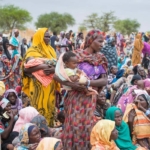
“Three months ago, I discovered the lump by accident. I never imagined it would be cancer. Since that day, everything changed, and my life has become a journey between hospitals and exorbitant bills in Uganda, the country of refuge.”
Rabhah Ismail, a Sudanese refugee in the Ugandan capital Kampala, never imagined that the bitterness of displacement would follow her beyond Sudan’s borders. She had left everything behind, but her suffering deepened when she was diagnosed with breast cancer.
Speaking to Al-Taghyeer newspaper, Rabhah says treatment is extremely costly, with a single chemotherapy session in private hospitals reaching about 600 dollars a month — an amount far beyond the reach of most Sudanese refugee women. Yet she represents only one of dozens of Sudanese women battling cancer in Uganda.
Rabhah fled, hoping to return home one day, but that dream remains distant amid ongoing warfare in multiple regions — foremost Darfur and Kordofan — where civilian areas, including hospitals, schools, and markets, continue to be targeted.
Dr Imtithal Jabir, a Sudanese physician based in Kampala, explains that Uganda lacks specialised facilities for cancer treatment, as the main centre is located in the capital, forcing patients from distant areas to travel long distances and shoulder heavy expenses.
Although treatment is supposed to be free for Sudanese refugees, they still bear indirect costs such as transport, lodging, and food during treatment periods. Jabir told the same newspaper that the lack of financial support forces many women to delay or abandon their therapy altogether, increasing the risk of complications and lowering the chances of recovery.
Targeting Civilian Sites
Since the outbreak of war in mid-April 2023, the Sudanese army and its allies — including the Muslim Brotherhood and armed movements — have continued to target densely populated civilian areas. The most recent case was a drone strike on a displaced persons’ camp in Al-Abbasiya Tagali, South Kordofan, two days ago, which killed seven civilians, including children, and injured others.
According to Darfur 24, eyewitnesses said the drone fired a projectile that struck a tent sheltering a displaced family.
Last Thursday, the Tasis Alliance Forces condemned what it called a “blatant assault” by the Sudanese army on the Al-Bur’ai Quranic schools complex in Al-Zareeba, North Kordofan, after drone strikes killed and wounded dozens of Quran students and scholars.
On June 22, a drone strike hit the general hospital in the city of Al-Mujlad, West Kordofan, killing and injuring dozens. At the time, the Tasis Alliance and local bodies accused the Sudanese army of carrying out the attack.
This is not the first time the army has faced accusations of targeting civilian zones. On June 4, Human Rights Watch reported that army drones had used unguided bombs in air raids on residential and commercial districts of Nyala, South Darfur, in early February.
The international organization deemed these indiscriminate attacks potential war crimes, having killed and wounded large numbers of civilians. Nyala — home to over 800,000 residents before the current conflict — is the largest city in Darfur and one of Sudan’s major urban centers.
Eyewitnesses said the February 3 strikes hit crowded residential and commercial areas in the Republic and Cinema neighborhoods in quick succession, as well as the main Congo Street. Médecins Sans Frontières (Doctors Without Borders) reported that 32 people were killed and dozens injured when an airstrike hit a grocery store near the Makkah Eye Hospital on a bustling street filled with people and vehicles.
The European Union imposed sanctions on the Sudanese army’s air force in June 2024 after verified reports of arbitrary aerial bombardments of densely populated residential areas since the beginning of the war, and later renewed the sanctions for another year.
These indiscriminate attacks, according to the global human rights organization, amount to war crimes that have killed and injured large numbers of civilians. Jean-Baptiste Gallopin, Senior Researcher in the Crisis, Conflict, and Weapons Division at Human Rights Watch, stated: “The Sudanese army bombed densely populated residential and commercial neighborhoods in Nyala. These strikes killed dozens of men, women, and children, destroyed families, and sowed fear and displacement.”
Life Returning to Normal
Since the war’s outbreak in April 2023, Sudanese hospitals have struggled to provide cancer treatment services. Many children and women have lost their access to regular therapy due to drug shortages and the displacement of medical staff across most states.
A 2020 World Health Organization report showed that breast cancer incidence in Sudan exceeds 41 cases per 100,000 women, with most cases diagnosed at late stages, according to Radio Dabanga.
In an attempt to restore normalcy, life is gradually returning to El-Fashir as humanitarian aid flows in. The Tasis Alliance continues to organize convoys of relief supplies distributed among residents and camp populations. The Tasis government has called for an immediate and unconditional end to the war, in line with the Quartet Mechanism’s proposal, the urgent opening of humanitarian corridors, and a fair, transparent investigation into all violations and crimes committed — free from politicization or biased media coverage.
The Al-Rakoba newspaper reported continued entry of food and medical aid trucks into El-Fashir to support hundreds of thousands of civilians facing dire humanitarian conditions due to prolonged fighting and disrupted supplies.
Local and international organizations have been distributing essential food and medicines amid severe security and logistical challenges. The continued flow of these convoys is seen as a critical step toward easing the famine threatening the city and its surroundings.
This effort represents the Tasis government’s response to international calls for ensuring safe corridors for humanitarian access to all civilians without obstruction, and for the rapid resumption of basic services.



